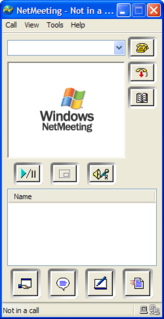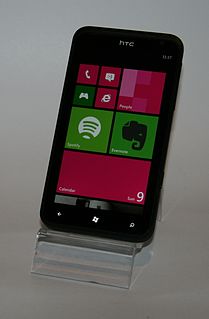Voice over Internet Protocol (VoIP), also called IP telephony, is a method and group of technologies for the delivery of voice communications and multimedia sessions over Internet Protocol (IP) networks, such as the Internet. The terms Internet telephony, broadband telephony, and broadband phone service specifically refer to the provisioning of communications services over the Internet, rather than via the public switched telephone network (PSTN), also known as plain old telephone service (POTS).

Yahoo! Messenger was an advertisement-supported instant messaging client and associated protocol provided by Yahoo!. Yahoo! Messenger was provided free of charge and could be downloaded and used with a generic "Yahoo ID" which also allowed access to other Yahoo! services, such as Yahoo! Mail. The service also offered VoIP, file transfers, webcam hosting, a text messaging service, and chat rooms in various categories.

Skype is a proprietary telecommunications application that specializes in providing video chat and voice calls between computers, tablets, mobile devices, the Xbox One console, and smartwatches over the Internet. Skype also provides instant messaging services. Users may transmit text, video, audio and images. Skype allows video conference calls.
SightSpeed is a videoconferencing company, supplying VoIP and instant messaging app for Windows and macOS operating systems. The service allows people to make video calls, computer-to-computer voice calls, and calls to regular telephones, with free and paid versions.
Teleo was a peer-to-peer Voice over Internet Protocol (VoIP) network founded in by Wendell Brown, Andy Moeck and Craig Taro Gold in 2004.

Microsoft NetMeeting is a discontinued VoIP and multi-point videoconferencing client included in many versions of Microsoft Windows. It uses the H.323 protocol for videoconferencing, and is interoperable with OpenH323-based clients such as Ekiga, OpenH323, and Internet Locator Service (ILS) as reflector. It also uses a slightly modified version of the T.120 Protocol for whiteboarding, application sharing, and file transfers.

Skype for Business Server is real-time communications server software that provides the infrastructure for enterprise instant messaging, presence, VoIP, ad hoc and structured conferences and PSTN connectivity through a third-party gateway or SIP trunk. These features are available within an organization, between organizations and with external users on the public internet or standard phones.

A VoIP phone or IP phone uses voice over IP technologies for placing and transmitting telephone calls over an IP network, such as the Internet, instead of the traditional public switched telephone network (PSTN).

Jajah was a VoIP provider, founded by Austrians Roman Scharf and Daniel Mattes in 2005. The Jajah headquarters was located in Mountain View, CA, USA, and Luxembourg. Jajah maintained a development centre in Israel. On 23 December 2009, it was announced that Jajah had been bought by Telefónica through its subsidiary Telefónica Europe. In December 2013, Telefónica announced that Jajah would shut down at the end of January 2014.
Mobiola is a wide range of software by SHAPE Services.
This is a comparison of voice over IP (VoIP) software used to conduct telephone-like voice conversations across Internet Protocol (IP) based networks. For residential markets, voice over IP phone service is often cheaper than traditional public switched telephone network (PSTN) service and can remove geographic restrictions to telephone numbers, e.g., have a PSTN phone number in a New York area code ring in Tokyo.
Truphone is a GSMA accredited global mobile network that operates its service internationally. The company is headquartered in London and has offices in ten other countries, being spread across four continents.
The Microsoft Cordless Phone System is a discontinued cordless telephone introduced by Microsoft in 1998 that featured personal computer integration. It was Microsoft's first telephone of any kind, and the only phone product made by the company until the Windows Mobile series of smartphones.

Google Voice is a telephone service that provides call forwarding and voicemail services, voice and text messaging, as well as U.S. and international call termination for Google Account customers in the U.S., and for Google Workspace customers in Canada, Denmark, France, Netherlands, Portugal, Spain, Sweden, Switzerland, and the UK. The service was launched by Google on March 11, 2009, after the company had acquired the service GrandCentral.
Skype offers a number of features based around calling, messaging, video chat, and file and screen sharing. The following is a partial list of Skype's features:

MSN Messenger, later rebranded as Windows Live Messenger, was a cross-platform instant messaging client developed by Microsoft. It connected to the Microsoft Messenger service while also having compatibility with Yahoo! Messenger and Facebook Messenger. The client was first released as MSN Messenger Service on July 22, 1999, and was marketed under the MSN branding until 2005 when it was rebranded under Windows Live. It has since been officially known by its second name, although its first name was still used colloquially by most of its users. In June 2009, Microsoft reported the service attracted over 330 million active users each month, placing Messenger among the most widely used instant messaging clients in the world.
A softphone is a software program for making telephone calls over the Internet using a general purpose computer rather than dedicated hardware. The softphone can be installed on a piece of equipment such as a desktop, mobile device, or other computer and allows the user to place and receive calls without requiring an actual telephone set. Often, a softphone is designed to behave like a traditional telephone, sometimes appearing as an image of a handset, with a display panel and buttons with which the user can interact. A softphone is usually used with a headset connected to the sound card of the PC or with a USB phone.
iConnectHere is the consumer division of Deltathree, which provides VoIP internet telephony service to consumers and businesses worldwide. The company's products are: Broadband (Internet) Phones, PC to Phone service, Mobile Dialers, Calling Cards and local phone numbers.

Windows Phone 7 is the first release of the Windows Phone mobile client operating system, released worldwide on October 21, 2010, and in the United States on November 8, 2010. It runs on the Windows CE 6.0 kernel.








